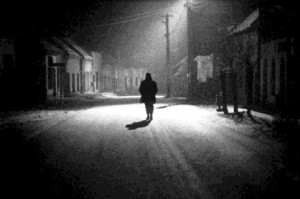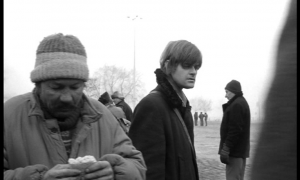From the Chicago Reader (October 1, 2000). — J. R.
A chilling, mesmerizing, intense account of ethnic cleansing (in spirit if not in letter) from Hungarian master Bela Tarr (2000, 145 min.), set in virtually the same overcast, rural black-and-white world as his Damnation and Satantango (both also cowritten by Laszlo Krasznahorkai). As in Satantango, Krasznahorkai worked with Tarr in adapting his own novel — in this case the first to be translated into English, The Melancholy of Resistance, elaborately restructured here in terms of narrative sequence and viewpoint so that it’s mainly limited to the experience of a simpleminded messenger and artist figure. A decrepit circus (actually a huge truck) in an impoverished town displays the stuffed body of the largest whale in the world while spreading rumors about but failing to deliver a foreign prince. Eventually the unemployed male locals head for the local hospital like a lynch mob and proceed to devastate the premises. Krasznahorkai’s parallels with southern gothic fiction are as striking as those with other eastern European allegories, yielding cadenced prose as monotonously grim as Thomas Bernhard’s. The long takes following characters — the structural equivalent of the novel’s Faulknerian sentences, though the content recalls Beckett’s comedy of inertia — underline our easy complicity with these monsters, and the actors, including Hanna Schygulla in a welcome comeback, are riveting. I miss the sarcasm and sweep of Satantango, but this is essential viewing, especially for anyone new to Tarr’s cinema. In German and Hungarian with subtitles. (JR)



